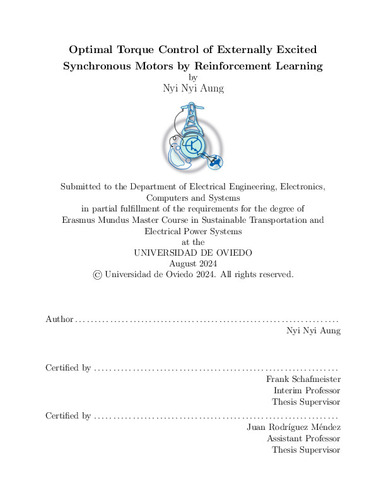Optimal Torque Control of Externally Excited Synchronous Motors by Reinforcement Learning
Autor(es) y otros:
Director(es):
Fecha de publicación:
Serie:
Máster Universitario Erasmus Mundus en Transporte Sostenible y Sistemas Eléctricos de Potencia
Descripción física:
Resumen:
Externally excited synchronous motors (EESMs) are a viable alternative to permanent mag-net synchronous motors (PMSMs). They do not require rare-earth materials and o↵er an additional degree of freedom in the control structure through the rotor circuit. Reinforcement learning (RL) o↵ers several advantages over conventional controllers such as field-oriented control (FOC) or model predictive control (MPC). RL is model-free and data-driven, making it particularly useful for complex dynamic systems. Once adequately trained, RL can manage nonlinear behavior with, theoretically, optimal performance without the use of a complicated explicit model. However, EESMs present a challenging control problem due to their complex dynamics and strong cross-coupling between axes. This makes it difficult for an RL agent to compre-hend the drive’s dynamic system and provide optimal actions within predefined constraints, such as current and voltage limitations. This thesis provides an initial proof of concept, demonstrating that a data-driven controller with proper reward design can effectively man-age the intricate system of an EESM.
Externally excited synchronous motors (EESMs) are a viable alternative to permanent mag-net synchronous motors (PMSMs). They do not require rare-earth materials and o↵er an additional degree of freedom in the control structure through the rotor circuit. Reinforcement learning (RL) o↵ers several advantages over conventional controllers such as field-oriented control (FOC) or model predictive control (MPC). RL is model-free and data-driven, making it particularly useful for complex dynamic systems. Once adequately trained, RL can manage nonlinear behavior with, theoretically, optimal performance without the use of a complicated explicit model. However, EESMs present a challenging control problem due to their complex dynamics and strong cross-coupling between axes. This makes it difficult for an RL agent to compre-hend the drive’s dynamic system and provide optimal actions within predefined constraints, such as current and voltage limitations. This thesis provides an initial proof of concept, demonstrating that a data-driven controller with proper reward design can effectively man-age the intricate system of an EESM.
Colecciones
- Trabajos Fin de Máster [5292]
Ficheros en el ítem





